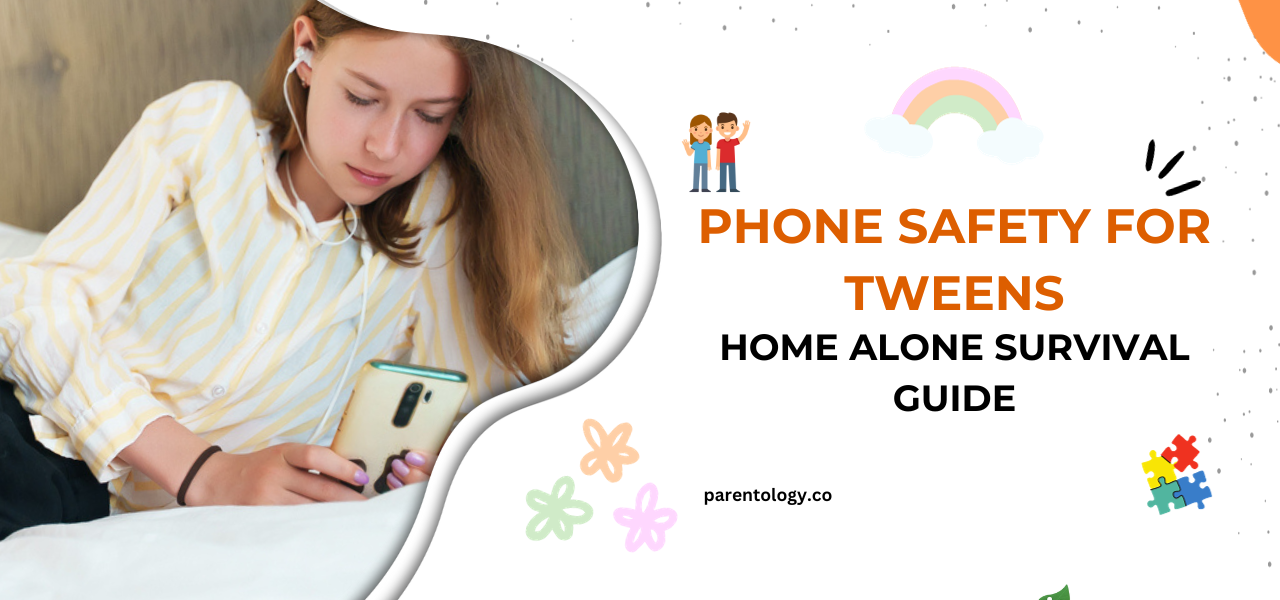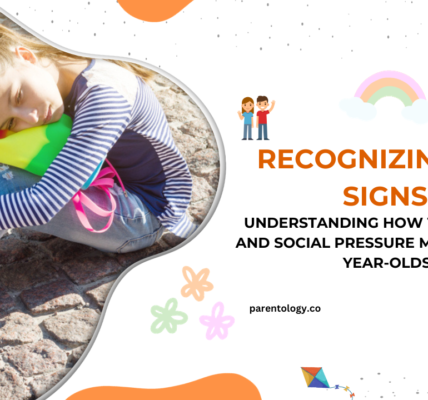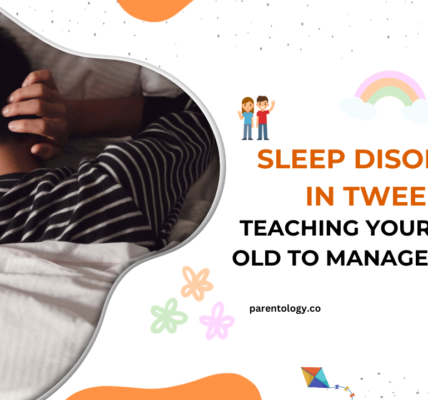In today’s digital age, ensuring phone safety for tweens when home alone involves more than just physical security. With the prevalence of smartphones, it’s crucial to address phone safety as a part of overall home-alone guidelines. This comprehensive guide covers everything parents need to know about keeping their tweens safe and secure, both physically and in the digital realm.
1. Introduction to Home Alone Safety
Leaving tweens home alone is a significant step in their independence journey. To make this transition smoother, parents must equip their children with the knowledge and tools to stay safe. This includes understanding the potential risks associated with phone usage.
2. The Role of Phone Safety for Tweens
Digital Communication Essentials
Phones serve as a lifeline for communication. Teach tweens how to use phones responsibly for emergencies and staying connected with parents.
Potential Risks
Explore the digital risks tweens might encounter, such as cyberbullying, inappropriate content, and online predators. Emphasize the importance of open communication.
3. Phone Safety Guidelines
Set Usage Rules
Establish clear guidelines on when and how the phone should be used. Define appropriate screen time and ensure tweens understand the consequences of violating these rules.
Privacy Settings
Teach tweens to navigate privacy settings. Show them how to control who can contact them, see their posts, and access their location.
Emergency Contacts
Program important contacts, including parents, neighbors, and emergency services. Ensure tweens understand when it’s appropriate to use these contacts.
4. Physical Safety Measures
Secure the Home
Beyond phone safety, physical safety is paramount. Outline procedures for securing doors and windows, and discuss what to do in case of unexpected visitors.
Emergency Exit Plan
Create a detailed emergency exit plan. Discuss escape routes, meeting points, and the importance of staying calm during emergencies.
5. Digital Etiquette and Online Respect
Social Media Awareness
Educate tweens on the importance of responsible social media use. Emphasize the potential consequences of sharing personal information and interacting with strangers online.
Recognizing Cyberbullying
Discuss signs of cyberbullying and establish an environment where tweens feel comfortable reporting any online harassment. Encourage kindness and empathy in digital interactions.
6. Staying Informed: Parental Involvement
Regular Check-ins
Maintain open communication by regularly checking in with your tween. Ask about their day, any concerns, or experiences they’ve had, both online and offline.
Parental Control Apps
Explore and install parental control apps that offer insights into your tween’s online activities. Strike a balance between monitoring and respecting their privacy.
7. Creating a Safe Space
Designated Safe Zones
Identify specific areas in the house as safe zones where tweens can retreat in case of any discomfort or fear. These areas should have easy access to a phone and be well-lit.
Emergency Drills
Conduct occasional emergency drills to ensure tweens are familiar with safety procedures. Practice scenarios like fire evacuations and phone usage during emergencies.
8. Building Responsible Habits
Time Management
Help tweens develop time management skills. Encourage them to complete homework and chores before engaging in recreational phone activities.
Setting Boundaries
Teach tweens the importance of setting boundaries, both online and offline. Instill the idea that it’s okay to say no and seek help when needed.
9. Addressing Peer Pressure
Digital Peer Pressure
Discuss the concept of digital peer pressure and equip tweens with strategies to resist negative influences. Encourage them to make responsible decisions online.
Offline Peer Pressure
Address the possibility of friends visiting when parents are away. Establish clear rules on allowing friends into the home and the importance of informing parents.
10. Encouraging Responsible Socialization
Virtual Hangouts
Guide tweens on engaging in virtual hangouts with friends. Encourage them to use platforms that prioritize user safety and privacy.
Friend Awareness
Discuss the importance of knowing who they communicate with online. Encourage tweens to only connect with friends they know and to be cautious about accepting friend requests.
11. Emergency Preparedness: Beyond the Basics
Health Emergencies
In addition to physical safety, educate tweens about recognizing health emergencies. Provide information on when and how to seek medical assistance if needed.
Communication Protocols
Establish communication protocols for different scenarios. Ensure tweens know when to contact parents directly and when to involve emergency services.
12. Digital Literacy Education
Critical Thinking Skills
Promote critical thinking online. Teach tweens to question information, fact-check, and be aware of potential misinformation circulating on the internet.
Educational Resources
Introduce educational resources that help tweens understand the digital landscape better. Online courses on digital literacy can equip them with valuable skills.
15. Recognizing Signs of Stress or Anxiety
Behavioral Changes
Be attuned to signs of stress or anxiety in your tween. Changes in behavior, sleep patterns, or academic performance may indicate the need for additional support.
Open Conversations
Create a safe space for tweens to express their feelings. Encourage open conversations about any challenges they may face, both online and offline.
14. Physical Health and Well-being
Healthy Habits
Reinforce the importance of maintaining a healthy lifestyle. Encourage regular exercise, a balanced diet, and sufficient sleep for overall well-being.
Screen Time Balance
Emphasize the need for balance in screen time. Establish rules that encourage breaks, outdoor activities, and other non-digital pursuits.
15. Peer-Reviewed Apps for Safe Online Exploration
Educational Apps
Introduce educational apps that cater to your tween’s interests. Ensure they engage in online activities that are both fun and enriching.
Parental Approval
Encourage tweens to seek parental approval before downloading new apps. This practice instills responsibility and opens avenues for discussion.
16. Creative Outlets and Hobbies
Offline Pursuits
Promote offline creative outlets and hobbies. Whether it’s painting, writing, or playing a musical instrument, these activities offer a healthy balance to digital engagement.
Screen-Free Zones
Designate specific areas in the home as screen-free zones, promoting activities that don’t involve phones. This fosters a well-rounded lifestyle.
17. Cybersecurity Education
Password Management
Teach tweens the importance of strong, unique passwords for their devices and accounts. Explore password management tools for added security.
Recognizing Phishing Attempts
Educate tweens about phishing scams and how to recognize suspicious messages or emails. Instill a cautious approach to online interactions.
18. Setting Boundaries with Friends
Online Friendships
Discuss the significance of setting boundaries with online friends. Encourage tweens to communicate openly about their digital friendships.
Offline Friendships
Emphasize the importance of maintaining offline friendships and spending quality time with friends face-to-face.
19. Reflecting on Independence
Regular Family Discussions
Engage in regular family discussions about your tween’s experiences when home alone. Encourage them to share challenges and successes, fostering a sense of support.
Adjusting Guidelines
Be flexible in adjusting guidelines based on your tween’s maturity and demonstrated responsibility. This collaborative approach strengthens trust.
FAQs – Addressing Common Concerns about Phone Safety for Tweens
Q1: What age is appropriate for leaving a tween home alone?
A1: The appropriate age varies, but generally, experts suggest around 12 years old. It depends on the maturity level and the child’s comfort with the idea.
Q2: How can I monitor my tween’s phone without invading their privacy?
A2: Utilize parental control apps that allow monitoring while respecting privacy boundaries. Establish trust and open communication.
Q3: Should I limit my tween’s screen time when home alone?
A3: Yes, setting screen time limits promotes a healthy balance. It ensures that tweens engage in other activities and stay focused on their responsibilities.
Conclusion: Empowering Tweens for Independence
As tweens take on the responsibility of being home alone, a holistic approach to safety is vital. Balancing physical and digital safety or phone safety for tweens, along with clear communication, ensures that tweens can confidently navigate this newfound independence. By following these guidelines, parents can create a safe and empowering environment for their tweens, fostering independence while maintaining a secure home.
For more parenting insights, visit Parentology and continue your journey as a mindful and empowered parent.





